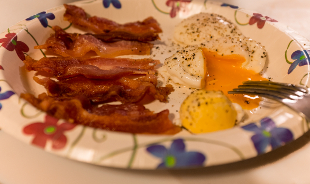 FLICKR, RPAVICHTen volunteers who agreed to eat a diet entirely provided by microbiologist Harvard Peter Turnbaugh and his colleagues are living proof of the gut microbiome’s lability. After five days, those that ate only animal products had a similar suite of bacteria in their guts, which varied dramatically from the microbiome of those feasting on a high-fiber, plant-only diet. Specifically, while the types of bacteria present remained largely unchanged, the abundances of different types responded to the dietary restrictions, according to a study published this week (December 11) in Nature.
FLICKR, RPAVICHTen volunteers who agreed to eat a diet entirely provided by microbiologist Harvard Peter Turnbaugh and his colleagues are living proof of the gut microbiome’s lability. After five days, those that ate only animal products had a similar suite of bacteria in their guts, which varied dramatically from the microbiome of those feasting on a high-fiber, plant-only diet. Specifically, while the types of bacteria present remained largely unchanged, the abundances of different types responded to the dietary restrictions, according to a study published this week (December 11) in Nature.
“It’s a landmark study,” Rob Knight, a microbial ecologist at the University of Colorado, Boulder, who was not involved with the work, told ScienceNOW. “It changes our view of how rapidly the microbiome can change.”
In 2009, Turnbaugh’s team had shown a similar effect in mice: a change in diet could affect the murine gut microbiome in a single day, in fact. To see if the results would hold up in people, Turnbaugh, along with Lawrence David from Duke University and their colleagues, fed five volunteers a high-protein diet, with meals of bacon and eggs for breakfast, spareribs and brisket for lunch, and salami and cheese for dinner. This group could also snack on pork rinds and string cheese. The high-fiber group, on the other ...





















